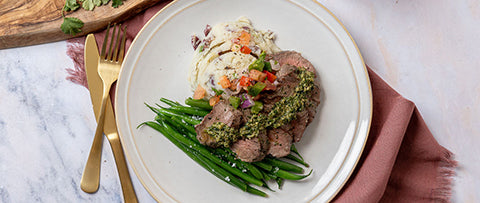There are many different ways you can eat to lose weight fast. As tempting as some of these diets are, most of them are likely to leave you hungry, unsatisfied, and eventually right back where you started. In order to lose weight and keep it off you have to commit to making your efforts and the foods you eat a lifestyle. So where do you start? How fast should you lose weight? What should you eat if you want to lose weight? Below are 5 tips for eating to lose weight.
1. Shoot for Sustainable Weight Loss
It’s normal for anyone to want to lose weight quickly. If I could lose 10 lbs by my high school reunion next month, I admit, I might be interested. But quick weight loss is not sustainable. It has been scientifically proven that people who lose weight at a slow and steady pace are more successful in keeping the weight off.
The most effective way to lose weight is to consume fewer calories than you burn, creating what is called a calorie deficit. Typically, if you’re eating for weight loss a calorie deficit of 500 calories per day is suitable and unlikely to negatively affect your health and energy levels. However, cutting too many calories could send your body into starvation mode. This then causes your metabolism to slow down and burn calories at a slow pace in order to conserve more energy. This is usually what causes people to hit a plateau and encounter stalled weight loss.
A healthy, sustainable weight loss is about 0.5 - 1 lb per week. Losing weight too rapidly can cause physical demands on your body which can lead to dehydration, malnutrition, muscle loss, and hair loss, among other health risks.
2. Modify Meal Time
Making a lifestyle change means modifying the things that we have control over, such as daily routine, amount of exercise, and diet. Eating for weight loss is very different from eating to gain weight or eating to maintain weight. In order to make this change, your usual meal time routine may need some tweaking.
Control your portions
If you’re making the change to eat for weight loss, chances are the amount of food you eat, or your portions, are going to change in size. Portion control may sound like a lot of work but downsizing your portions is an easy, sustainable way to change your eating habits for weight loss. Measuring your portions is a way to ensure that you are getting the right amount of calories for your weight loss.
Have your meals prepared ahead of time
When you’ve had a long day full of meetings or you’re rushing out of the door in the morning, it can be tempting to grab something in the drive-thru down the street or even just skip a meal completely. Eating enough and eating the right foods are vital for healthy weight loss. Prepping your meals ahead of time not only makes portion control easier, but will save you time on those busy days and help you stay on track. Prepping your own meals is a great way to keep tabs on exactly what you’re eating and how much. Also, you control the ingredients and can make sure that you are getting the right amount of calories and nutrients to aid in your weight loss. If you can’t find the time to prepare your meals weekly, look into a healthy meal prep company to save time.
Eat slower
Here comes that busy schedule getting in the way again. A lot of people tend to eat their food quickly and carelessly without even taking the time to savor it or even chew it properly. Eating too fast doesn’t give your body a chance to realize it’s full which leads to overeating and weight gain instead of weight loss. Pump the breaks and slow down when it’s time for a meal. Eliminating distractions and taking the time to chew and savor your food will help you to feel satisfied, control your portions, and overall be more mindful when eating.
3. Know your numbers
Everyone’s calories and macros are going to be different based on factors unique to that person such as gender, age, activity level, height, current weight, goal weight, etc. The key to successfully achieving your weight loss goals is to know the amount of calories and macro nutrients needed for you to lose weight.
Your body needs calories to survive and especially needs calories on the journey to weight loss. Consuming too little or too many calories can both result in weight gain so it’s important to know how many calories you need to consume daily. You can find your daily calorie needs using this Calorie Calculator.
In addition to knowing the proper amount of calories for your weight loss, you should also make sure that you have a healthy balance of macronutrients or “macros” in your diet. Macronutrients refer to the main nutrients your body requires in large amounts: carbohydrates, fat, and protein.
Carbohydrates
Carbs tend to get a bad rep and it is important to know that not only is it ok to consume them when trying to lose weight, they are needed in your diet! Carbohydrates provide your body with energy and are found in food such as fruits, vegetables, breads, pastas, and dairy products. It is also important to remember that not all carbs are created equal. When eating carbs, you want to make sure that you are consuming complex, slow digesting, high fiber carbs. You want to avoid processed, quick digesting, refined carbs.
The Academy of Nutrition and Dietetics suggest that 30-60% of your daily caloric intake should be from carbohydrates.
Fat
There are three different types of fat, unsaturated, saturated and trans. Unsaturated fat can protect against heart disease, aid in brain and eye health, and slow digestion. The best kinds of unsaturated fats to consume are fish, eggs, olive oil, avocado, and nuts.
Saturated fats, while beneficial, should be consumed in moderation. The best types of saturated fats to consume include things like red meats, cheese, and butters. Trans fats should also be limited and even avoided when trying to lose weight. Trans fats can increase risk for heart disease, decrease HDL, and increase LDL. They include fried foods, baked goods, pastries, or anything that can sit on a shelf for a long time.
25-35% of your daily caloric intake should be from fat.
Protein
Your body needs protein to build and repair tissues and it is an important component of every cell in the body. The best kinds of protein to consume are lean, and hormone and antibiotic free (poultry, fish, lean red meats, eggs, yogurt, beans/legumes for plant based eaters). High marbleized meats that contain large amounts of saturated fat are what you want to avoid.
25-40% of your daily caloric intake should be from protein.
4. Eat Quality Food
Now we’re getting to the good stuff, what should you eat if you want to lose weight?! The answer is actually quite simple...real, quality food. Quality food is real, minimally processed, slow digesting, nutrient dense, and leaves you feeling full and energized.
While convenient, processed foods can negatively affect weight loss as they are often packed with extra sugar, contain artificial ingredients, are high in refined carbs and low in nutrients. Replacing processed foods with real foods such as whole grains, lean antibiotic and hormone free proteins like chicken and turkey, fibrous vegetables, legumes, fish and eggs, will keep your weight loss on track.
Click here to learn more about how you can incorporate quality food into your diet.
5. Track Your Progress
Losing weight takes time and commitment and the journey can also present itself with its fair share of obstacles. Typically when trying to lose weight, you’ll want to give yourself at least 3-6 months, maybe even a year on your new plan to see the progress and lifestyle change that you’re working for.
Tracking your progress is important when it comes to staying focused and reaching your goals. Not only is it fun to see your progress from start to finish, it’s motivating and helps solidify your new habits! Habits are crucial for weight loss. Begin with body measurements. Common body measurements include those of the arms, legs, waist, and hips. As you lose weight these body parts are where you will lose inches. If you choose to incorporate exercise, these measurements can reveal details about your workout that may be working well for you or may need improvement.
Most importantly, you want to track your food. Tracking your food means keeping a record of ALL of the food and beverages you consume. Tracking every single thing you eat and drink may seem like a lot and a little obsessive but it is actually one of the most important keys to weight loss. Tracking your food creates awareness and helps you hold yourself accountable. Eventually you will start to learn more about your eating habits, and things like portion control, meal planning, and eating quality foods will get easier and easier.
There are many different ways you can track your weight loss journey. You can use a pen and paper to track your progress or use your smartphone, which is super easy and convenient thanks to tracking apps. Our favorite app is MyFitnessPal. MyFitnessPal allows you to easily log your food, beverages, exercise, weight, and measurements.
Committing to weight loss and staying on track is hard work, and with the right knowledge, support and resources you can reach your goals. Hopefully these tips will help you to see it as a journey and not a final destination. If you think you may need some extra help with your weight loss journey, you may want to consider meeting with a licensed and registered dietitian.






